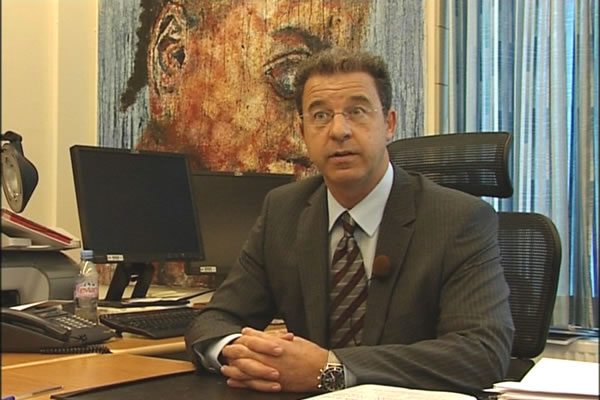Home
BRAMMERTZ: APPEALS JUDGMENT FOR KOSOVO ‘ON TRACK’
The Tribunal’s chief prosecutor Serge Brammertz has given an exclusive statement to the SENSE Agency TV program, TV Tribunal. Brammertz highlighted the importance of the Appeals Chamber’s finding in the case against the Kosovo Four: the judges concluded that the ‘specific direction’ of actions to the commission of crimes wasn’t an element of aiding and abetting. ‘We are pleased that the jurisprudence is again somehow on track’, said Brammertz
 Serge Brammertz, chief prosecutor of the Tribunal
Serge Brammertz, chief prosecutor of the Tribunal Following the final judgment for the four former Serbian political, police and military officials convicted for the Kosovo crimes in 1999, Chief Prosecutor Serge Brammertz gave an exclusive statement to the SENSE Agency’s TV program, TV Tribunal. Brammertz stressed the importance of the Appeals Chamber’s finding that the ‘specific direction’ of actions to the commission of crimes wasn’t an element of aiding and abetting.
‘The Appeals Chamber departed from the reasoning in the case against Momcilo Perisic and explained very much in detail why specific direction is not required and why it is not supported by the Tribunal’s jurisprudence, by other international jurisprudence and national legislation’, Brammertz said. The standard of specific direction as an element of aiding and abetting was applied to acquit former chief of the VJ General Staff Momcilo Perisic in February 2013. Perisic was acquitted of the crimes perpetrated by Bosnian and Croat Serb forces who had received financial, logistic and personnel support from the accused.
Perisic’s appellate judgment contained 50-odd pages. In the Kosovo Four case, the Appeals Chamber explained its findings in more than 800 pages. As Brammertz notes, the Appeals Chamber ‘analyzed in detail the international and national jurisprudence’. ‘We are satisfied that the jurisprudence is now again somehow on track’, Brammertz said, adding that ‘we will see’ the impact of the judgment on other cases currently on appeal, where the issue of ‘specific direction’ has been raised.
This is the case in the proceedings against police general Vlastimir Djordjevic, who was sentenced to 27 years for the crimes in Kosovo in 1999. Djordjevic’s final judgment will be handed down on Monday, 27 January 2014. The OTP hopes that the appellate judgment rendered in the Kosovo Four case yesterday will have an impact on the outcome of the appellate proceedings in the case against the former chiefs of the Serbian State Security Jovica Stanisic and Franko Simatovic, who were acquitted, again thanks to the application of the specific direction standard.
Although Perisic’s judgment is final, the prosecution could call for its review within a year of its delivery. This deadline expires on 28 February 2014. Brammertz said that the OTP ‘are looking into all procedural legal remedies we could use to have the Perisic case reopened’, including the findings of the latest Kosovo judgment. However, ‘no decision has been taken in this regard so far’, Brammertz concluded.
In addition to the departure from the application of the specific direction standard, the chief prosecutor highlighted another important element in the Kosovo Four appellate judgment: the treatment of sexual violence. According to Brammertz, in the trial judgment sexual violence ‘was considered as not being part of ethnic cleansing campaign and not planified or organized violence’. The appellate judges concluded that ‘sexual violence which has taken place in the context of the ethnic cleansing campaign in Kosovo was a part of the cleansing strategy of persecution as a crime against humanity’. ‘It is an important achievement which is very much confirming the direction in which the jurisprudence is going in recognizing that sexual crime, sexual violence during the conflict is not just something happening but is really planified and is part of crimes committed and very often part of the strategy of ethnic cleansing’, the chief prosecutor noted.
Brammertz said in the end that ‘justice has been delivered’ with this judgment, adding that he hoped the victims would be ‘satisfied’ with the Appeals Chamber’s decision.
On Thursday, the Appeals Chamber confirmed the findings in the trial judgment about the involvement in the joint criminal enterprise of former federal deputy prime minister Nikola Sainovic, former commander of the VJ 3rd Army Nebojsa Pavkovic, and former commander of the MUP for Kosovo Staff Sreten Lukic. The Appeals Chamber also confirmed that Vladimir Lazarevic, former commander of the Pristina Corps, aided and abetted the joint criminal enterprise headed by Slobodan Milosevic. The 22-year sentence was confirmed only for Pavkovic. Sainovic’s sentence was reduced to 18 years, and Lukic’s to 20 years in prison. The Trial Chamber’s sentence to Lazarevic was reduced by 12 months; this means that he should spend 14 years in prison.
Linked Reports
- Case : Miscellaneous
- 2013-11-29 DEFENSE LAWYERS ON TRIBUNAL’S LEGACY
- 2013-11-27 SARAJEVO CONFERENCE: ODE TO TRIBUNAL OR REQUIEM FOR JUSTICE?
- 2013-11-22 DUTCH MINISTER ‘SHOCKED’ AT RELEASE OF WAR CRIMINALS
- 2014-06-05 TRIBUNAL REPORTS TO UN SECURITY COUNCIL
- 2014-07-16 HOLLAND LIABLE FOR DEATHS OF MORE THAN 300 SREBRENICA MEN
- 2014-09-22 SENSE – SREBRENICA DOCUMENTATION CENTER OPENED
